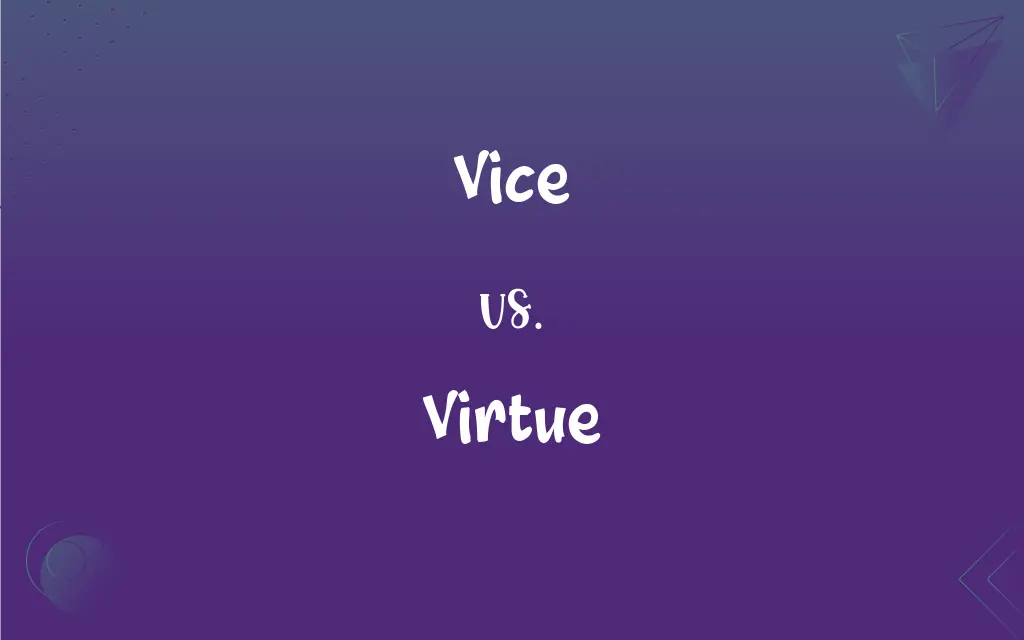Vice vs. Virtue: What's the Difference?
Edited by Aimie Carlson || By Harlon Moss || Updated on November 7, 2023
Vice refers to immoral or wicked behavior, whereas virtue is behavior showing high moral standards.

Key Differences
Vice is a moral failing or a bad habit, such as greed or dishonesty. Virtue, conversely, represents good habits or qualities like honesty or generosity. Each person may have their own understanding of what constitutes vice and virtue, often influenced by cultural and personal ethics.
The concept of vice implies a weakness of character, an inclination towards actions that are harmful to oneself or others. Virtue stands as the opposite, signifying strength of character and an inclination toward actions that are beneficial and morally upright.
Engaging in a vice often leads to negative consequences and is usually looked down upon by society. Engaging in virtue tends to yield positive outcomes, earning respect and admiration from others. Vices and virtues are often seen as the dark and light sides of human nature, respectively.
While vice and virtue are seen as opposites, they are not always mutually exclusive in practice. A person may exhibit vices in some aspects of their life while demonstrating virtues in others. The balance between vice and virtue in a person's actions can greatly influence their personal and social life.
In literature and philosophy, vice and virtue are often personified or used as themes to explore the complexity of human morality. Throughout history, various vices and virtues have been codified by religions and philosophical doctrines, reflecting the values of different societies and eras.
ADVERTISEMENT
Comparison Chart
Definition
Immoral or wicked behavior.
Moral excellence or righteousness.
Connotation
Negative, indicative of a flaw.
Positive, indicative of good character.
Social Impact
Often leads to harm or societal disapproval.
Promotes wellbeing and is esteemed.
Personal Effect
Can lead to personal harm or regret.
Tends to result in self-respect and integrity.
Representation
Often symbolized by figures of evil or corruption.
Often symbolized by figures of goodness or purity.
ADVERTISEMENT
Vice and Virtue Definitions
Vice
Immoral or depraved behavior.
Lying is considered a vice by many cultures.
Virtue
A good or useful quality of a thing.
The virtue of this software is its user-friendly interface.
Vice
A bad habit.
Smoking is a vice he's been trying to quit.
Virtue
A commendable quality or trait.
Her patience is a virtue that has served her well in teaching.
Vice
An evil act.
The vice of theft is punishable by law.
Virtue
Moral excellence.
Honesty is a virtue that is universally respected.
Vice
A weakness of character.
His vice was his uncontrollable temper.
Virtue
Chastity, especially in a woman.
In many historical texts, a woman's virtue was synonymous with her chastity.
Vice
A fault or defect.
Procrastination is a vice that can hinder professional success.
Virtue
Power or efficacy.
The healing virtues of this plant have been known for centuries.
Vice
A practice or habit considered to be evil, degrading, or immoral
The vices of smoking and drinking.
Virtue
Moral excellence and righteousness; goodness.
Vice
Wicked or depraved conduct or habits; corruption
"sharpers, desperadoes, pirates, and criminals steeped in vice" (Carl Holliday).
Virtue
An example or kind of moral excellence
The virtue of patience.
FAQs
How is vice depicted in literature?
Vice is often depicted as a corrupting force that leads to a character's downfall.
Can vice be subjective?
Yes, what is considered vice can vary between cultures and individuals.
Can someone change a vice into a virtue?
With effort and commitment, people can work to overcome vices and cultivate virtues.
Can a virtue ever be considered a vice?
Excess of virtue can be considered a vice, such as in cases where honesty might hurt someone unnecessarily.
How do societies benefit from virtues?
Virtues like cooperation and integrity can lead to more harmonious and prosperous societies.
Can an action be both a vice and a virtue?
Depending on the context and intention, an action could be seen differently by different people.
Is humility a virtue?
Yes, humility is widely regarded as a virtue.
What are examples of vice?
Greed, envy, and gluttony are examples of vice.
Are virtues always religious?
While many virtues are emphasized in religious texts, they are also recognized in secular contexts.
Can legal actions be vices?
Yes, some legal actions may still be considered vices, like smoking in many regions.
Is pride a vice or a virtue?
Pride can be both: a virtue when it involves self-respect, a vice when it denotes arrogance.
Are virtues innate or learned?
Virtues are typically learned through cultural norms and personal practice.
How can virtue be cultivated?
Virtue can be cultivated through education, reflection, and striving to embody moral principles.
Do vice and virtue apply only to individuals?
While often applied to individuals, these concepts can also refer to groups or organizations.
Can virtues conflict with each other?
Yes, sometimes one virtue can be in conflict with another, such as honesty and kindness.
Can vice have any positive aspects?
While generally negative, some argue that certain vices can lead to positive outcomes, like ambition driving success.
What vice is commonly warned against in many cultures?
Excessive drinking is commonly warned against as a vice in many cultures.
Does everyone agree on what behaviors are vices?
No, there is significant disagreement on what constitutes a vice, reflecting diverse moral views.
Are all pleasures vices?
Not all pleasures are vices; many can be enjoyed without moral compromise.
Is laziness a vice?
Laziness is typically considered a vice as it can lead to negative outcomes.
About Author
Written by
Harlon MossHarlon is a seasoned quality moderator and accomplished content writer for Difference Wiki. An alumnus of the prestigious University of California, he earned his degree in Computer Science. Leveraging his academic background, Harlon brings a meticulous and informed perspective to his work, ensuring content accuracy and excellence.
Edited by
Aimie CarlsonAimie Carlson, holding a master's degree in English literature, is a fervent English language enthusiast. She lends her writing talents to Difference Wiki, a prominent website that specializes in comparisons, offering readers insightful analyses that both captivate and inform.































































